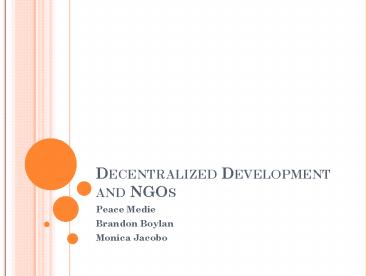Decentralized Development and NGOs - PowerPoint PPT Presentation
Title:
Decentralized Development and NGOs
Description:
... SCALING UP Five Types of NGO Scaling Up Additive Strategy (increase in size) Multiplicative Strategy ... HODSON: NGO GROWTH Problems with NGO growth Workers ... – PowerPoint PPT presentation
Number of Views:135
Avg rating:3.0/5.0
Title: Decentralized Development and NGOs
1
Decentralized Development and NGOs
- Peace Medie
- Brandon Boylan
- Monica Jacobo
2
Golden Oldies
- Kasfir, Designs and Dilemmas An Overview, In
Local Government and the Third World (Mawhood
ed.) - Mawhood, Decentralization The Concept and the
Practice, In Local Government in the Third World
(Mawhood ed.) - John Armstrong, The European Administrative Elite
3
Designs and Dilemmas An Overview Nelson Kasfir
- 1) Why did African states lose such a
decentralization? - Colonial legacy on traditional social practices
- Fundamental poverty
- Central government needed for economic growth
- Fear to criticism/opposition
- 2) What are the chances of success of more recent
proposals? - For most countries, new decentralization
arrangement will fail because of discontinuities
between institutions, deepening poverty, current
beliefs about the necessity of vertical control,
and threats perceived by those in power.
4
Mawhood-Decentralization The Concept and the
Practice
- Pure decentralization is rarely implemented
- Instead, most countries practice deconcentration
- A decentralized body should have
- Its own body
- Separate legal existence
- Authority to allocate substantial resources
- A range of different functions
- Representation of the people
5
Mawhood-Decentralization The Concept and the
Practice
- Countries could combine two tiers of management
- Purpose of central-local relations
- Political control
- Economic regulation
- Minimum standards of welfare
- Administrative efficiency
6
Armstrong Europe and Decentralization
- Focus on relationship between prefects and
prefectures - France
- -prefects primary responsibility was to
suppress opposition - -prefects controlled police
- Russia
- -prefects dominated police
- -prefects influenced engineering corps
(infrastructure) - -prefects did not control tax system
7
Armstrong Europe and Decentralization
- Prussia
- -collegiality among prefects led to exclusion of
others with different training - -group decision-making, thus, was slow and
efficient - -too legalistic, without focus on policy
potential - Britain
- -central system promoted system of grants
instead of direct control - -inspection, not direction
- -local districts had more control over tax
collection, but not allocation
8
Literary Map
9
(No Transcript)
10
Synthesis
11
Martinussen Decentralization and Development
- Four types of decentralization
- Deconcentration
- Delegation
- Devolution
- Privatization
- Decentralization has been used to promote
efficiency and effectiveness but local
governments are not always capable - Central and local government and NGOs should work
together to fill gaps
12
Martinussen Decentralization and Development
- Society and state centered concepts of economic
development. - Myrdals concept of the soft state which assumes
that state is the primary engine of growth. - Critiqued by market and participation theories
- Ethnic identities can be politicized and can
affect development planning and distribution of
resources.
13
Staudt NGOs
- Peoples participation can enhance development
planning and practice - Bottom-up mobilization is most effective
- The role of NGOs along with their funding sources
have e
14
Clark, Turner and Hulme
- Are NGOs decentralization necessary for
development? - NGOs are not a panacea for poverty reduction.
They have comparative advantages but cannot be a
substitute for state provision of social services
(TH). - Decentralization in developing countries has not
made government interventions more effective in
promoting development (TH). - Given the world crisis, NGOs have a critical role
to play. Their opportunity to influence the
development process has never been greater.
However, this new role demands an evolution from
their starting point. The challenge is to move
from a tactical to a strategic approach (Clark).
15
Edwards Hulme Scaling Up
- Five Types of NGO Scaling Up
- Additive Strategy (increase in size)
- Multiplicative Strategy (encourage others to
expand) - Explosive Strategy (Adapting large-scale projects
to local circumstances) - Associational Strategy (Interconnectedness)
- Self-Spreading and Self-Improving Strategy
(advocating good practice)
16
Hodson NGO Growth
- Problems with NGO growth
- Workers suspicion of hierarchy
- Participatory decision-making
- Factors that affect NGO growth
- Voluntary and involuntary changes, resistance to
growth, compromised solution, training,
leadership, decision-making processes































